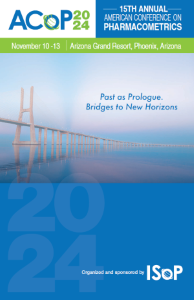QSP
(M-006) An innovative paradigm for non-small cell lung cancer clinical trial simulations through the Integration of a quantitative systemic pharmacology model and pharmacodynamic model of gemcitabine
Monday, November 11, 2024
7:00 AM - 5:00 PM MST
Nicolas Ratto, n/a – Biomodeler, Novadiscovery; Loïc Etheve, n/a – Biomodeler, Novadiscovery; Jean-Pierre Boissel, n/a – Co-founder, Novadiscovery; Nicholas Holford, n/a – Professor Emeritus, Pharmacology & Clinical Pharmacology, Faculty of Medical and Health Sciences, University of Auckland; Adèle L'Hostis, n/a – Biomodeler, Novadiscovery; Claudio Monteiro, n/a – Biomodeler, Novadiscovery
- ET
Elea THIBAULT GREUGNY, n/a
Biomodeler
Novadiscovery, France - SA
Simon Arsène, PhD
Executive Manager
Novadiscovery, France
Author(s)
Presenter(s)
Objectives: We propose an approach that combines a quantitative systemic pharmacology (QSP) disease model of non-small cell lung cancer (NSCLC) [1] with an existing drug pharmacodynamics (KPD) model of gemcitabine [2]. Through a minimal calibration step and limited data, this integrative framework seeks to bridge the gap between understanding disease progression mechanisms and drug actions, paving the way for a new paradigm in simulating and optimizing clinical trials.
Methods: The combined model is constructed by integrating the NSCLC disease model, which accounts for tumor growth and other relevant phenomena, with the segment of the gemcitabine KPD model representing treatment time-course and magnitude. The logical connection between both models is established based on gemcitabine's inhibition of tumor growth, as outlined in the KPD model. Due to a significant difference in modeling hypotheses—specifically, the assumption of tumor steady state in the KPD model, which differs from the dynamic nature of the disease progression model—two additional parameters are introduced in the combined model. These parameters are calibrated to reproduce the median patient behavior observed in the clinical data used to build the KPD model.
Results: A virtual population is created based on the patient characteristics and the estimated variability of PD parameters provided by Tham et al. [2]. The clinical results provided in the previous publication are successfully reproduced through simulations of gemcitabine treatment on this virtual population.
Conclusions: The combination of disease and treatment models, coupled with minimal calibration, offers significant enhancements to both models' capabilities. This approach holds promise for the future of QSP modeling.
Citations: [1] L'Hostis, A. et al. Knowledge-based mechanistic modeling accurately predicts disease progression with gefitinib in EGFR-mutant lung adenocarcinoma. npj Systems Biology and Applications vol. 9 (2023).
[2] Tham, L.-S. et al. A Pharmacodynamic Model for the Time Course of Tumor Shrinkage by Gemcitabine + Carboplatin in Non–Small Cell Lung Cancer Patients. Clinical Cancer Research vol. 14 4213–4218 (2008).
Methods: The combined model is constructed by integrating the NSCLC disease model, which accounts for tumor growth and other relevant phenomena, with the segment of the gemcitabine KPD model representing treatment time-course and magnitude. The logical connection between both models is established based on gemcitabine's inhibition of tumor growth, as outlined in the KPD model. Due to a significant difference in modeling hypotheses—specifically, the assumption of tumor steady state in the KPD model, which differs from the dynamic nature of the disease progression model—two additional parameters are introduced in the combined model. These parameters are calibrated to reproduce the median patient behavior observed in the clinical data used to build the KPD model.
Results: A virtual population is created based on the patient characteristics and the estimated variability of PD parameters provided by Tham et al. [2]. The clinical results provided in the previous publication are successfully reproduced through simulations of gemcitabine treatment on this virtual population.
Conclusions: The combination of disease and treatment models, coupled with minimal calibration, offers significant enhancements to both models' capabilities. This approach holds promise for the future of QSP modeling.
Citations: [1] L'Hostis, A. et al. Knowledge-based mechanistic modeling accurately predicts disease progression with gefitinib in EGFR-mutant lung adenocarcinoma. npj Systems Biology and Applications vol. 9 (2023).
[2] Tham, L.-S. et al. A Pharmacodynamic Model for the Time Course of Tumor Shrinkage by Gemcitabine + Carboplatin in Non–Small Cell Lung Cancer Patients. Clinical Cancer Research vol. 14 4213–4218 (2008).

